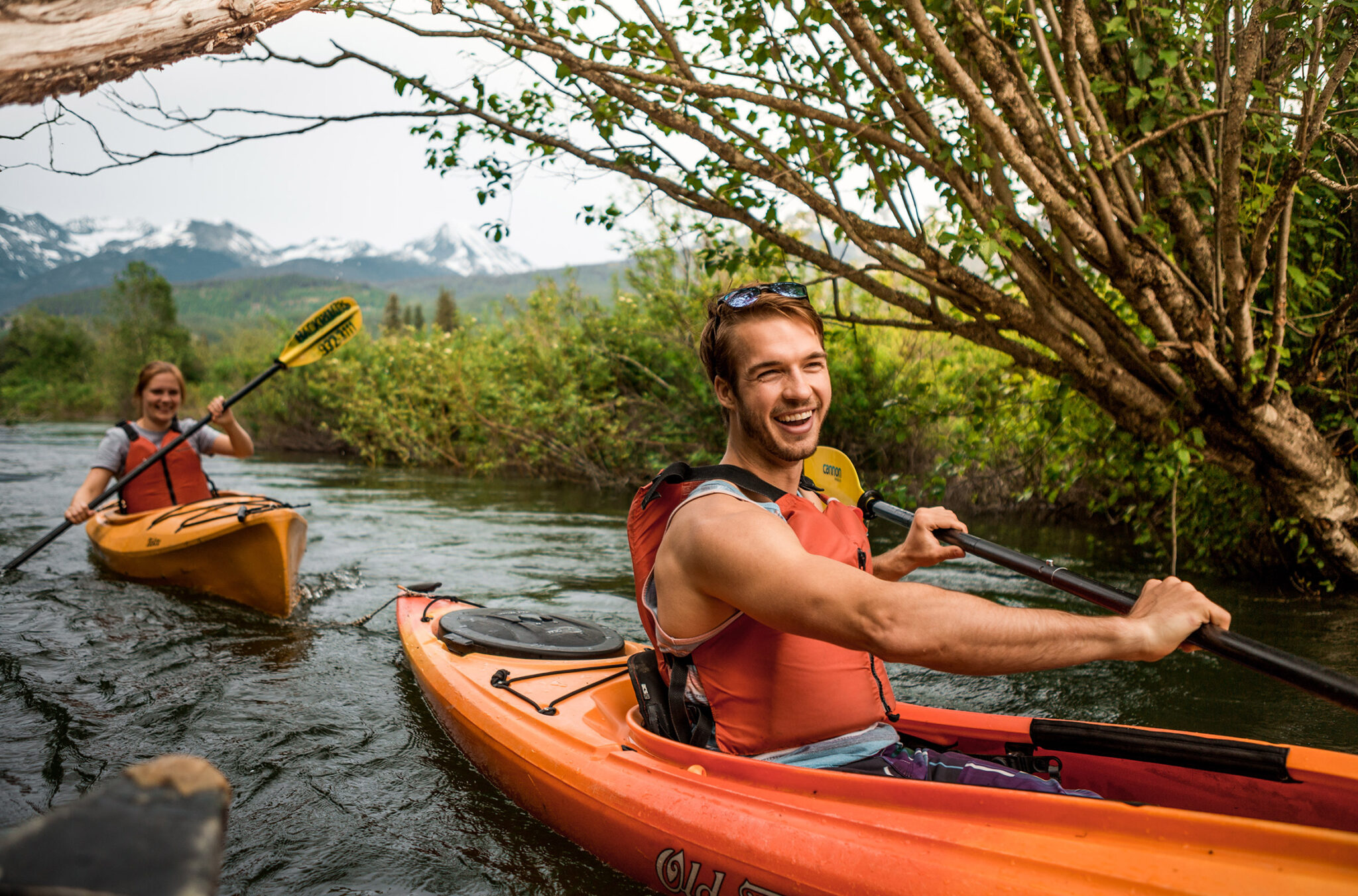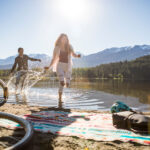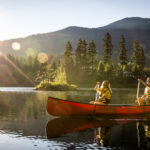“Just a short walk or ride from the manicured charm of Whistler Village is a watercourse that transports you to a wild place packed with natural wonders. That’s the beauty of the River of Golden Dreams,” Eric Wight, Founder of Backroads Whistler.
The River of Golden Dreams weaves its way five kilometres from Alta Lake to Green Lake, through lush and abundant wetlands with snowcapped mountains as the backdrop. Paddling its waters is a Whistler must-do, as seeing the land and its inhabitants from the viewpoint of the water opens up another world.
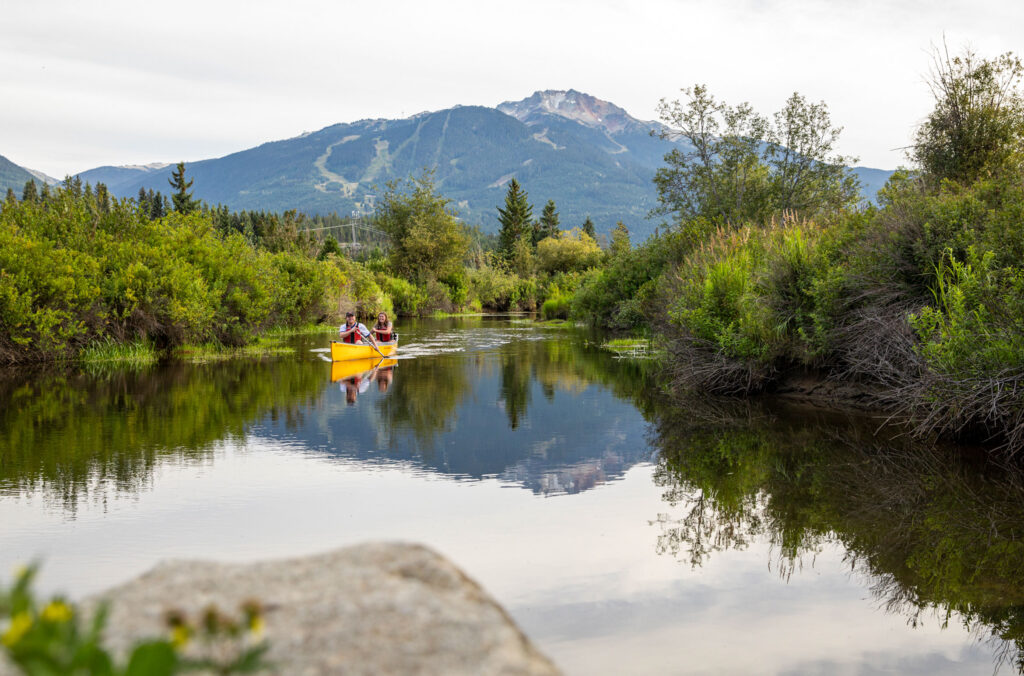
“We often see bears, beavers, fish, ducks, geese, eagles, cranes, otters, deer, racoons and many other birds when we’re out on the boats, ” says Spencer, Eric’s son and Backroads’ Director. “The River of Golden Dreams is a fundamental ecosystem of the Whistler Valley and is home to many of the critters that reside here.
Flora on the river ranges from large cedar and fir trees towering over the gentle waters, to waterside shrubs and mountain ash bushes that bear red berries that the local black bears love to eat. Flowering lilly pads and water daisies sprout from the river bottom resting on the water surface. This creates stunning scenery from the river bed up into the canopy.
Exploring via water is different, it’s typically slower-paced and quiet. It gives you the time to really look at your surroundings and notice the smaller things.”
Eric opened Backroads Whistler in 1985, the longest-running, boat-exclusive operation on Whistler’s lakes. When he first came to the mountains he got into mountain biking, but as a fisherman, he was soon drawn to the lakes. Eric’s always seen himself and his team as stewards of the river, a sentiment he’s passed on to his son, Spencer.
“When Spencer was a baby, we’d put him in the storage hatch of our kayaks,” laughs Eric.”It feels like I was born on the river,” Spencer responds. “We have a symbiotic relationship with the river, wetlands and wildlife. We’re constantly thinking of how we can protect it and how we can make things better.”
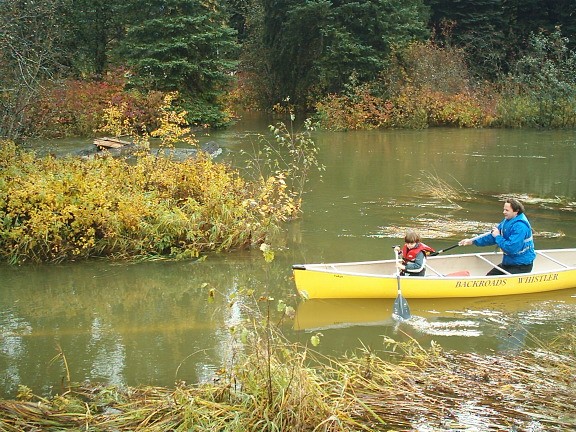
New Fish Weir in the River of Golden Dreams
To this point, both father and son have been advocating for a new fish weir along the river that’s going in this summer. Historically, fish weirs were built to catch fish, but the one going into the River of Golden Dreams is for juvenile fish passage, increasing water levels (in times of drought) and reducing user impacts on the streambed.
In the 1950s, Whistler was all about fishing, but it quickly developed into an all-season resort and with this came expansion and in some cases, this affected the waterways.
“When the railroad went in,” explains Tara Schaufele, Environmental Stewardship Supervisor at the Resort Municipality of Whistler (RMOW). “Sections of the River of Golden Dreams were altered, which, along with other factors, has led to some habitat degradation. We know we need to pro-actively address these things when we look at how to make the ecosystem healthier and that’s what we’re doing.”
Tara explained that the new fish weir is replacing two existing log weirs. Through research, they found that the older weirs were impeding juvenile fish passage, which the new, engineer-designed weir fixes.
“We’ve been looking at studies going back 20 years to form the current plan for the new fish weir,” explains Tara. “The Department of Fisheries and Oceans and the province have reviewed project plans, an environmental assessment has been conducted and we have consulted with experts on the project plan. This new weir will enhance the habitat and reduce visitor impacts on the ecosystem.”
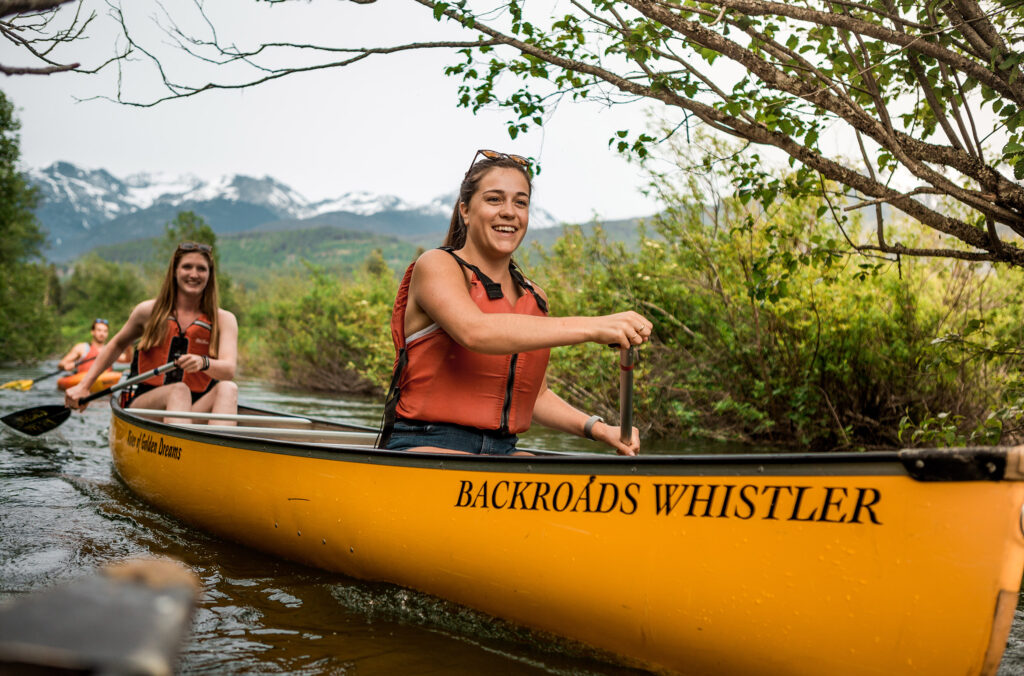
For the weir to go in the River of Golden Dreams will be closed in early August (details on the closure will be posted on the RMOW website closer to the time). This is Whistler’s regionally-specific “fish window” when the work will cause the least disturbance to fish and other wildlife.
“At the same time as we’re doing the weir, we’re also doing riparian planting in three locations along the river. The shading and shelter of this foliage will help with rising water temperatures caused by climate change,” adds Tara.
There will also be a new light system that will help water-goers with their navigation decisions based on water levels. Red means it’s a no-go (water levels are too high and vessels won’t get under the CN bridge), yellow is a warning to use caution and a green light for go.
The RMOW and Eric and Spencer are more than excited to see the addition of the new weir this summer. Advocating for things like this is part of that precious, symbiotic relationship the Backroads team spoke about, one that protects what’s important.
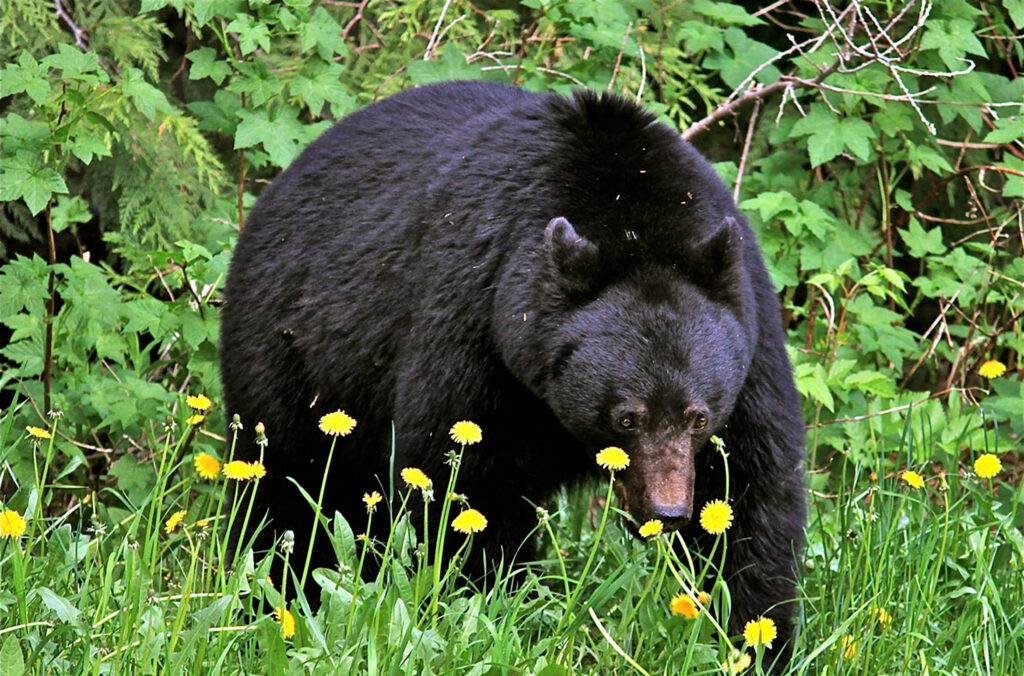
Why Go Guided on the River of Golden Dreams?
You could steer your own way down the river, but if you want to know what animals and birds frequent the area, what plants grow and how they all fit into the history of Whistler, then a guided tour is the way to go.
As stewards of the river, the Backroads team has a 10-day natural environment training program for their guides. Although they have guides who have been cruising the waters for years, some of them come from overseas and although they might be great with a J stroke, they don’t know the flora and fauna of the area.
“Our team are really passionate about guiding and being able to impart their knowledge to the people who come on the tours,” says Spencer. “If they don’t know an answer to a question they’ll get it to you by the end of the tour, they’re just built that way!”
The Backroads team is so sure that having a guide adds to the experience that they have a guide guarantee; if people take a guided tour but feel it wasn’t worth it, they can get the guide fee back, no questions asked.
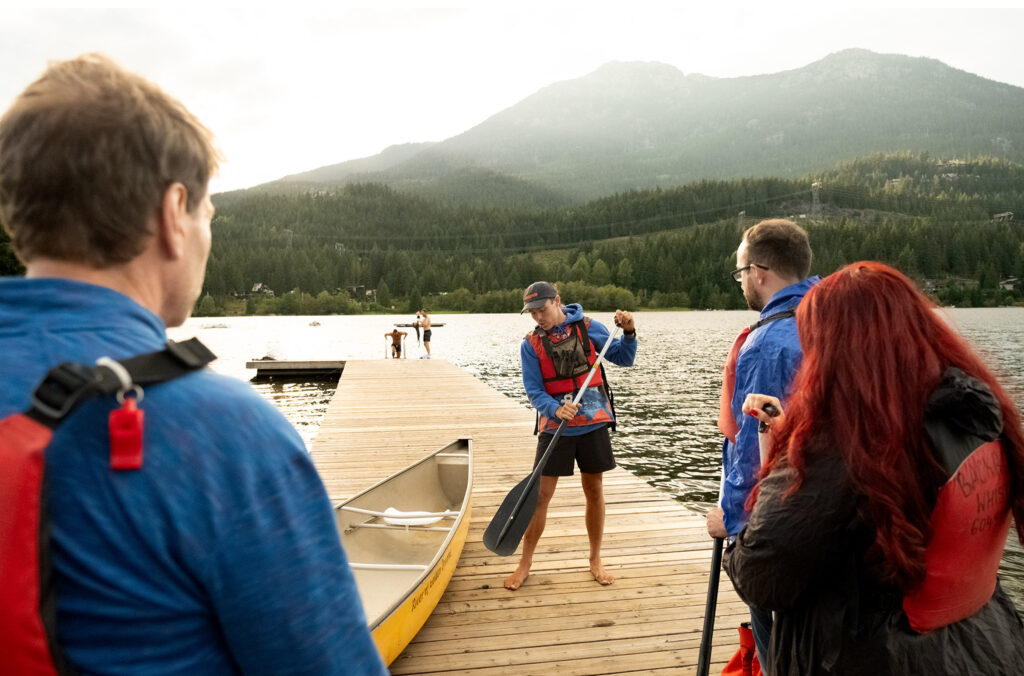
Although the River of Golden Dreams is relatively flat, it does have a current and knowing how to steer makes it a better experience. Backroads takes people through dryland training before they even get in a boat and takes extra care of guests who might be completely new to paddling. Even with this training, it’s slightly less stressful to have a guide/instructor on hand should you need them! They even have, what they call, a “Dolly Lama” where a team member assists guests at the mandatory portage by e-biking the boats down to the next water point. Now that’s service.
If you’re confident on the water you can also go self-guided, armed with some tips from the Backroads team before you set off.
Being a Steward of the River
Along with advocating for the new fish weir, Eric and Spencer have been involved with lake and river clean-up days for decades.
“At one point, we had a huge problem with people going down the river in inflatables,” says Eric. “There’s a lot of overhanging vegetation that can tear these crafts and we could see them lining the riverbed. People weren’t respecting the environment. However, over the last few years, we’ve really seen a turn-around. The Whistler community held themselves and visitors to account and we’re picking up less discarded litter these days.”
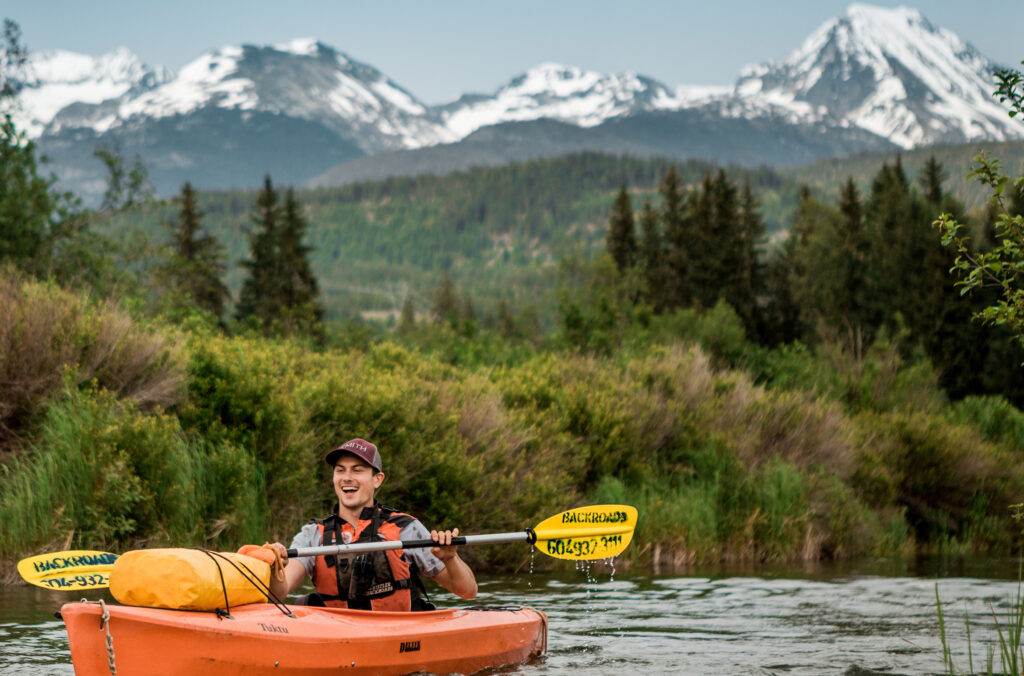
Having the best boats for the river is another thing the Backroads team is focused on because the wrong boats can cause unnecessary damage. They import their Delsyk Tuktu kayaks from Europe.
“It costs quite a bit for us to ship our kayaks from Slovenia,” explains Eric. “But they’re higher at the cockpit and gunnel which makes them more stable and easier to manage on the River of Golden Dreams. This means less disturbance on the river and a better experience for our guests. It’s this level of detail and dedication that’s needed to ensure this river thrives.”
Take a Paddle Down the River of Golden Dreams
It’s about a three-hour round-trip to do the River of Golden Dreams, with 20 to 30 minutes on the lake getting warmed up and paddling to the river mouth. You then follow the current as you steer your boat down the river. Guided and self-guided options include a return shuttle bus (you can’t paddle back up the river), your boat, paddles and a personal flotation device (and a guide if you go guided!).
Tours start May 11, 2024, on weekends with weekdays being added in June (this is weather dependent). Children under 12 who sit in the middle seats of a canoe go half-price. Group and private tours are also available.
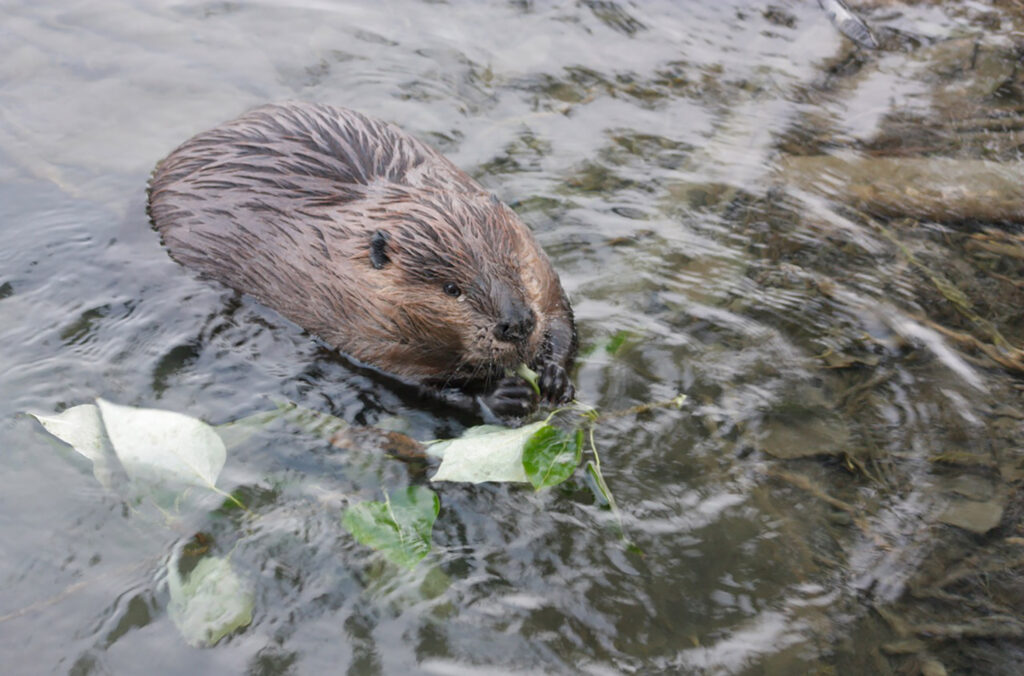
For wildlife and nature lovers, look at the Twilight Trip as this is when you’ll likely see the most animal action. Head down the river at dusk just as all the nocturnal animals emerge from their dens and take over the river.
Beavers start their busy journeys up and downstream, gnawing on sticks and building dams. The cranes stand on the river banks watching for dinner swimming upstream. These trips are offered for six weeks of the summer, July into mid-August, and sell out, so book yours.
Accessibility
Backroads was recently assessed by Spinal Cord Injury BC (SCI BC), who was very impressed with what they saw. The pathway to Lakeside Park is accessible for most people and there’s a transfer chair on the dock, which can be used to lower guests into the water.
“Mobility can be challenging, particularly with water activities; however, the staff at Backroads Whistler try to get everyone onto the water regardless of ability,” says Nancy Harris, SCI BC Regional Development Liaison and Access BC Lead. “They offer a double kayak for individuals who require assistance with navigating, and one of the staff members has solid experience working with people from the autism community.”
Spencer and his team are passionate about getting more people onto the water, contact them to discuss your specific needs.
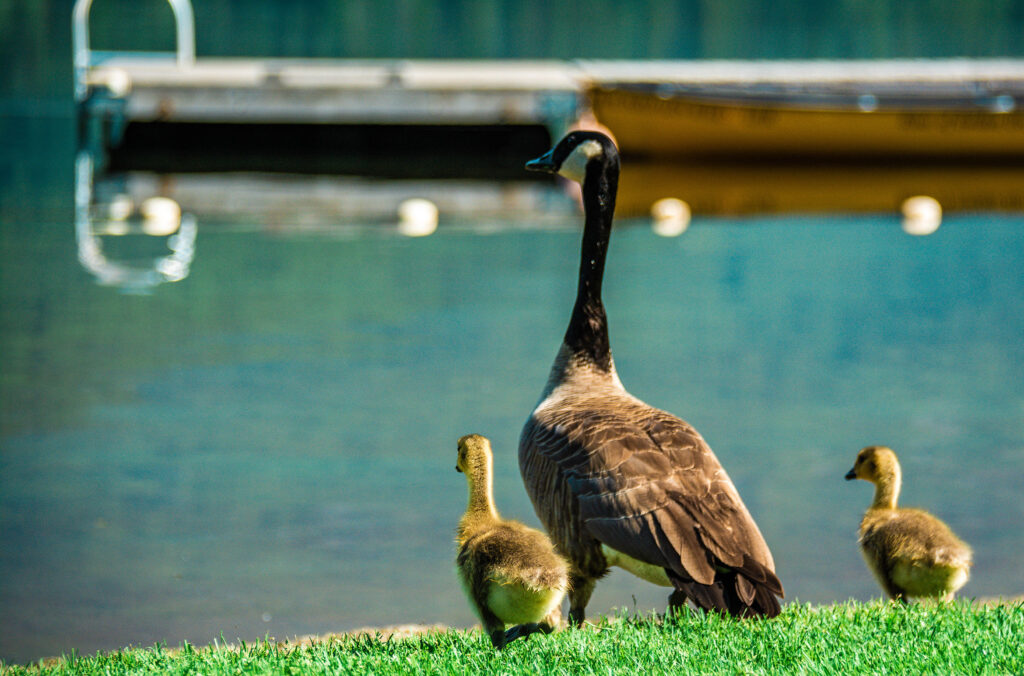
You’ll find the Backroads team at Lakeside Park on the shores of Alta Lake. We’d advise booking a trip in advance, but you can also rock up and see what’s available on the day.
See you on the river!
Spring offers great value with savings of up to 25% on lodging. Stretch your stay into midweek for even more savings and a quieter village. For every third night you book between March 1 - April 30, 2025, receive a free $75 CAD Whistler Après Voucher.
For summer, book ahead and save up to 30% on lodging. Plus, you'll receive a free $150 CAD Activity Voucher on stays of 3 or more nights.
Insider Tip: BC or Washington resident? Sign up for Whistler Rewards to access additional savings and exclusive perks.
